 W
WAkata Witch is a 2011 fantasy novel written by Nnedi Okorafor.
 W
WAmericanah is a 2013 novel by the Nigerian author Chimamanda Ngozi Adichie, for which Adichie won the 2013 U.S. National Book Critics Circle Award for fiction. Americanah tells the story of a young Nigerian woman, Ifemelu, who immigrates to the United States to attend university. The novel traces Ifemelu's life in both countries, threaded by her love story with high school classmate Obinze. It was Adichie's third novel, published on May 14, 2013 by Alfred A. Knopf. A television miniseries, starring and produced by Lupita Nyong'o, was in development for HBO Max.
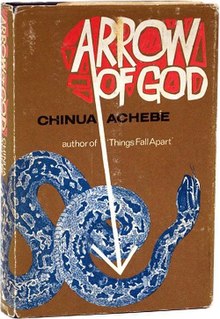 W
WArrow of God, published in 1964, is the third novel by Chinua Achebe. Along with Things Fall Apart and No Longer at Ease, it is considered part of The African Trilogy, sharing similar settings and themes. The novel centers on Ezeulu, the chief priest of several Igbo villages in colonial Nigeria, who confronts colonial powers and Christian missionaries in the 1920s. The novel was published as part of the influential Heinemann African Writers Series.
 W
WThe Bride Price is a 1976 novel by Nigerian writer Buchi Emecheta. It concerns, in part, the problems of women in post-colonial Nigeria. The author dedicated this novel to her mother, Alice Ogbanje Emecheta.
 W
WBurning Grass is a novel by Nigerian author Cyprian Ekwensi, first published in 1962 as part of the Heinemann African Writers Series.
 W
WChike and the River is a children's story by Chinua Achebe. It was first published in 1966 by Cambridge University Press, with illustrations by Prue Theobalds, and was the first of several children's stories Achebe would write. The latest reprint has a cover design by Victor Ekpuk.
 W
WThe Dogs of War (1974) is a war novel by Frederick Forsyth featuring a small group of European mercenary soldiers hired by a British industrialist to depose the government of the fictional African country of Zangaro. The story details a geologist's mineral discovery, and the preparations for the attack: soldier recruitment, training, reconnaissance, and the logistics of the coup d'état. Like most of Forsyth's work, the novel is more about the protagonists' occupational tradecraft than their characters. The source of the title, The Dogs of War, is Act III, scene 1, line 270 of Julius Caesar (1599), by William Shakespeare: Cry, 'Havoc!', and let slip the dogs of war.
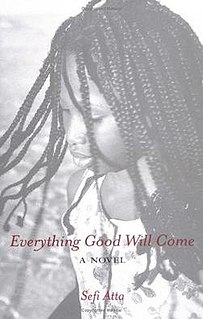 W
WEverything Good Will Come is a coming-of-age novel by Nigerian author Sefi Atta about a girl growing into a woman in postcolonial Nigeria and England. It was published by Interlink World Fiction in 2005, and won the Wole Soyinka Prize for Literature in Africa.
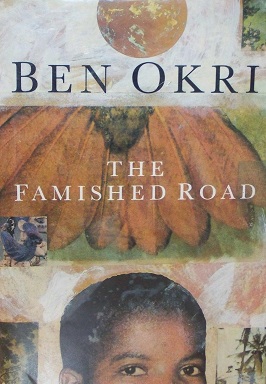 W
WThe Famished Road is a novel by Nigerian author Ben Okri, the first book in a trilogy that continues with Songs of Enchantment (1993) and Infinite Riches (1998). Published in London in 1991 by Jonathan Cape, the story of The Famished Road follows Azaro, an abiku or spirit child, living in an unnamed African, most likely Nigerian, city. The novel employs a unique narrative style incorporating the spirit world with the "real" world in what some have classified as Animist Realism. Others have labeled it African Traditional Religion realism, while still others choose simply to call the novel fantasy literature. The book exploits the belief in the coexistence of the spiritual and material worlds that is a defining aspect of traditional African life.
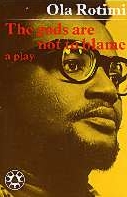 W
WThe Gods Are Not To Blame is a 1968 play and a 1971 novel by Ola Rotimi. An adaptation of the Greek classic Oedipus Rex, the story centres on Odewale, who is lured into a false sense of security, only to somehow get caught up in a somewhat consanguineous trail of events by the gods of the land.
 W
WA Good Man in Africa is the first novel by William Boyd, published in 1981. It won both the Whitbread Book Award for a first novel and the Somerset Maugham Award that year.
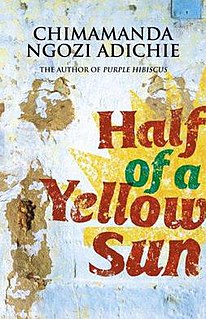 W
WHalf of a Yellow Sun is a novel by Nigerian author Chimamanda Ngozi Adichie. Published in 2006 by Knopf/Anchor, the novel tells the story of the Biafran War through the perspective of the characters Olanna, Ugwu, and Richard.
 W
WThe Island of Eternal Love is a novel by Cuban author Daína Chaviano.
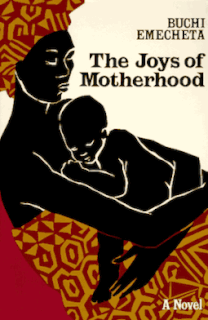 W
WThe Joys of Motherhood is a novel written by Buchi Emecheta. It was first published in London, UK, by Allison & Busby in 1979 and was reprinted in Heinemann's African Writers Series in 2008. The basis of the novel is the "necessity for a woman to be fertile, and above all to give birth to sons". It tells the tragic story of Nnu-Ego, daughter of Nwokocha Agbadi and Ona, who had a bad fate with childbearing. This novel explores the life of a Nigerian woman, Nnu Ego. Nnu’s life centres on her children and through them, she gains the respect of her community. Traditional tribal values and customs begin to shift with increasing colonial presence and influence, pushing Ego to challenge accepted notions of "mother", "wife", and "woman". Through Nnu Ego’s journey, Emecheta forces her readers to consider the dilemmas associated with adopting new ideas and practices against the inclination to cleave to tradition. In this novel, Emecheta reveals and celebrates the pleasures derived from fulfilling responsibilities related to family matters in child bearing, mothering, and nurturing activities among women. However, the author additionally highlights how the ‘joys of motherhood’ also include anxiety, obligation, and pain.
 W
WLokotown and Other Stories is a collection of nine short stories by Nigerian author Cyprian Ekwensi, published in 1966 as the 19th volume in the African Writers Series. Looking at Nigerian city life, his stories show excitement and dissolution.
 W
WA Man of the People (1966) is a novel by Nigerian writer Chinua Achebe. Written as a satirical piece, A Man of the People follows a story told by Odili, a young and educated narrator, on his conflict with Chief Nanga, his former teacher who enters a career in politics in an unnamed fictional 20th century African country. Odili represents the changing younger generation; Nanga represents the traditional West African customs, inspired by that of Achebe's native Nigeria. The book ends with a military coup, similar to the real-life coup organized by Major Chukwuma Kaduna Nzeogwu, Major Adewale Ademoyega, Major Emmanuel Ifeajuna, Captain Chris Anuforo, Major Donatus Okafor, and Major Humphrey Chukwuka.
 W
WNo Longer at Ease is a 1960 novel by Nigerian author Chinua Achebe. It is the story of an Igbo man, Obi Okonkwo, who leaves his village for an education in Britain and then a job in the Nigerian colonial civil service, but is conflicted between his African culture and Western lifestyle and ends up taking a bribe. The novel is the second work in what is sometimes referred to as the "African trilogy", following Things Fall Apart and preceding Arrow of God. Things Fall Apart concerns the struggle of Obi Okonkwo's grandfather Okonkwo against the changes brought by the English.
 W
WOne Man, One Matchet was written by Nigerian author T. M. Aluko and published in 1964 as the 11th book in the Heinemann African Writers Series. The novel tells the story of a community in Western Nigeria during the end of the colonial period and beginning of independence. Set in a small community where the majority of the inhabitants are dependent on the revenue from their cocoa crops, the story looks at the role of the semi-literate Benjamin Benjamin in the small community.
 W
WAn Orchestra of Minorities is a 2019 novel by Chigozie Obioma. It is his second novel after his debut, The Fishermen. It is a modern twist of the Odyssey and Igbo cosmology. The novel's narrator is a deceased spirit chi or Qi.
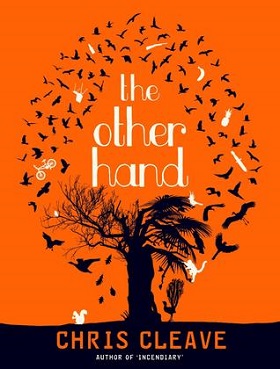 W
WThe Other Hand, also known as Little Bee, is a 2008 novel by British author Chris Cleave. It is a dual narrative story about a Nigerian asylum-seeker and a British magazine editor, who meet during the oil conflict in the Niger Delta, and are re-united in England several years later. Cleave, inspired as a university student by his temporary employment in an asylum detention centre, wrote the book in an attempt to humanise the plight of asylum-seekers in Britain. The novel examines the treatment of refugees by the asylum system, as well as issues of British colonialism, globalization, political violence and personal accountability.
 W
WThe Other Side of Truth is a kid's for ages 10+ novel about Nigerian political refugees, written by Beverley Naidoo and published by Puffin in 2000. It is set in the autumn of 1995 during the reign in Nigeria of the despot General Abacha, who is waging a campaign of suppression against journalists. A Nigerian girl and her younger brother must leave suddenly after their mother is killed in a failed assassination of their outspoken father. They are put in to London but abandoned and they must cope with the police, social services and school bullies. Naidoo won the annual Carnegie Medal from the Library Association, recognising the year's best children's book by a British subject.
 W
WThe Palm-Wine Drinkard is a novel published in 1952 by the Nigerian author Amos Tutuola. The first African novel published in English outside of Africa, this quest tale based on Yoruba folktales is written in a modified English or Pidgin English. In it, a man follows his brewer into the land of the dead, encountering many spirits and adventures. The novel has always been controversial, inspiring both admiration and contempt among Western and Nigerian critics, but has emerged as one of the most important texts in the African literary canon, translated into more than a dozen languages.
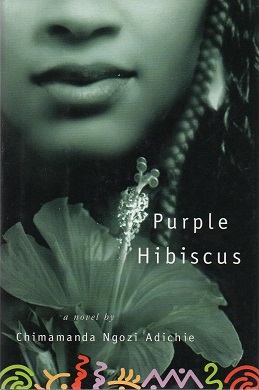 W
WPurple Hibiscus is a novel written by the Nigerian author Chimamanda Ngozi Adichie. Her debut novel, it was first published by Algonquin Books in 2003.
 W
WSeason of Crimson Blossoms is an adult fiction debut novel by Nigerian writer and journalist Abubakar Adam Ibrahim. The novel, set largely in the outskirts of Abuja, Nigeria, depicts an unusual salacious affair between the 55-year old widow Hajiya Binta and the 26-year old drug dealer and local gang leader Reza.
 W
WThe Shadow Speaker, is a young adult, first-person novel by Nigerian-American writer Nnedi Okorafor, which takes place in the year 2070. The Shadow Speaker was a Booksense Pick for Winter 2007/2008, a Tiptree Honor Book, a finalist for the Essence Magazine Literary Award, the Andre Norton Award and the Golden Duck Award and an NAACP Image Award nominee.
 W
WThe Slave Girl is a 1977 novel by Nigerian writer Buchi Emecheta that was published in the UK by Allison and Busby and in the US by George Braziller. It won the Jock Campbell Award from the New Statesman in 1978. The novel was Emecheta's fourth book; it was dedicated to her editor Margaret Busby.
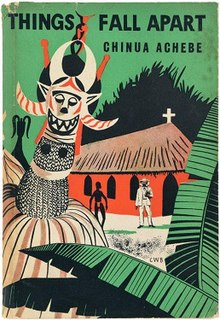 W
WThings Fall Apart is the debut novel by Nigerian author Chinua Achebe, first published in 1958. Its story chronicles pre-colonial life in the southeastern part of Nigeria and the arrival of Europeans during the late 19th century. It is seen as the archetypal modern African novel in English, and one of the first to receive global critical acclaim. It is a staple book in schools throughout Africa and is widely read and studied in English-speaking countries around the world. The novel was first published in the UK in 1962 by William Heinemann Ltd., and became the first work published in Heinemann's African Writers Series.
 W
WZahrah the Windseeker is young adult fantasy novel by Nigerian American writer Nnedi Okorafor, published in September 2005. It incorporates myths and folklore and culture of West Africa. It is the winner of the 2008 Wole Soyinka Prize for Literature in Africa. Okorafor was born in the United States to two Nigerian (Igbo) parents.